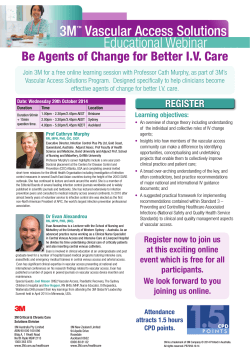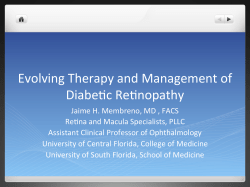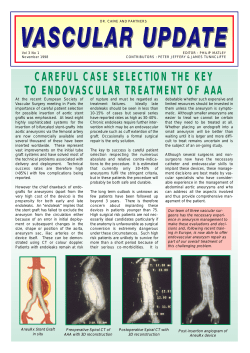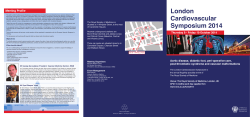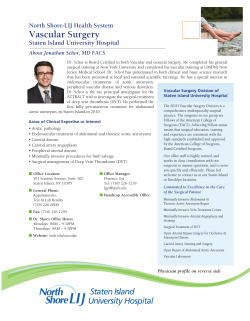
Policy Statement‐approved 14 November 2010 P O
UEMS DIVISION OF ANGIOLOGY/VASCULAR MEDICINE PPO ULLAARR M MEED DIICCIIN NEE OLLIICCYY SSTTAATTEEM MEEN NTT O ON N AAN NGGIIO OLLO OGGYY//VVAASSCCU Definition of Angiology/Vascular Medicine (A/VM) Angiology/Vascular Medicine is the Medical Specialty dealing with Vascular Diseases (arterial, venous, lymphatic ad microcirculatory diseases) and focused on prevention, diagnosis, therapy and rehabilitation as well as research and education, to benefit patients and the general population. Angiology/Vascular Medicine are synonyms in different Countries. Why a Specialty in Angiology/Vascular Medicine • Increased demand by health care professionals for qualified education in Angiology/Vascular Medicine • Increasing prevalence of Vascular Diseases mainly due to increased life expectancy • There is a strong need for prevention of Vascular Diseases • Most chronic Vascular Diseases require a life‐long follow‐up (see 2005 WHO indications) • A high majority of vascular diseases are medical area competences • Qualified specialised medical care reduces costs (with human, social and economical advantages) • Need to respect the European Citizens’ right to have both options (Medical or Surgical) as for other Specialties Situation of the Specialty in Angiology/Vascular Medicine in Europe • Recognised Specialty: Angiology /Vascular Medicine is an independent Specialty in Switzerland and a Specialty after the Common Trunk in Germany, Austria, Czech Republic and Slovak Republic. • Several Countries have National recognition / Diplomas • A European Master on Angiology/Vascular Medicine (inter‐University agreement) and a European Fellowship on Angiology/Vascular Medicine are available under the VAS –Vascular ‐Independent Research and Education‐ European Organization’s Educational Proposals • Most European Countries have Angiology/Vascular Medicine Units/Departments/Centres UEMS Angiology/Vascular Medicine Division and the Board (EBAVM) • Angiology/Vascular Medicine Division was recognized as a Division by the UEMS Council in October 2007 and activated in June 2008. • The UEMS Division European Board of Angiology/Vascular Medicine (EBAVM) consists of one Member (with the possibility of a second deputy Member) of each of the UEMS Full Member Countries (with voting rights) and of two Members of VAS ‐ Vascular ‐ Independent Research and Education ‐ European Organisation. The EBAVM can also include representatives (and deputies) of Scientific Societies from extra‐EU Countries (as observers). The EBAVM Members and deputies must be officially appointed by the Scientific Society it represents and should hold the curriculum of a specialist in Angiology/Vascular Medicine • National Societies and VAS ‐ Vascular ‐ Independent Research and Education ‐ European Organization are already represented in the EBAVM. VAS Vascular Independent Research and Education European Organisation • European Scientific no‐profit Association is open to non‐European Countries (www.vas‐int.org ) • Network of clinical and research Centres and Specialists active in the field of Angiology /Vascular Medicine • The final aim is fighting against Vascular Disease for its prevention and for the benefit of patients and the society, supporting European projects of specialist Training, Independent Research, Awareness, according to principles of Quality, Independence and Collaboration • In 2000 VAS applied to UEMS for the recognition of the UEMS‐Division of A/VM; it has represented A/VM in the UEMS Internal Medicine Section over these last years and achieved, in 2007, the recognition of the Angiology/Vascular Medicine Division from the UEMS Council. Policy Statement‐approved 14 November 2010 Principles of the UEMS Division UEMS Division is finalised to guarantee: • European high quality standards of care and Curriculum • The right of European Citizens to have qualified specialists in the medical field (Angiology/Vascular medicine) • Focus its activity on patients and on Public Health How to guarantee Quality • Define European Core Curriculum • Define criteria for Teaching Centres • Centrally organized Audits with defined criteria • Recognise and support the European educational programmes (European Master in Angiology/Vascular Medicine, European Fellowship in Angiology/Vascular Medicine) • Support European collaborative independent research projects • Support and promote initiatives finalised to obtain recognition of an EU qualified Specialty in Angiology / Vascular Medicine in every European Country Main Principles for a European Core Curriculum The Core Curriculum plans 5 certified years of training (see detailed program). The optimal training would be: • At least 2 years Common Medical Trunk training • 3‐year training in an accredited Angiology/Vascular Medicine Unit/Dept The Core Curriculum will be European. Tools to promote its adoption at each national level will be arranged. European Diploma in Angiology/Vascular Medicine(EDAVM) According to CESMA’s guide‐lines where the Division is represented, European Diploma in Angiology/Vascular Medicine will be instituited. • To obtain the title, the criteria for admission must be met, and the European exam passed. • What requirements to apply? Four qualified curricula allow the admission (taking into account the dishomogeneous distribution of the Specialty Schools in the different European Countries): 1. Specialty in Angiology/Vascular Medicine in one European Country or equivalent in non‐ European Countries. 2. Any related Specialty and at least 3 years of certified training in an accredited Angiology/Vascular Medicine Unit/Dept. 3. Any related Specialty and the European Fellowship in Angiology/Vascular Medicine. 4. Any related Specialty and the European Master in Angiology/Vascular Medicine . UEMS DIVISION OF ANGIOLOGY/VASCULAR MEDICINE President: M. Catalano mariella.catalano@unimi.it vas@unimi.it Secretary:P.Poredos (VAS‐Vascular‐Independent Research and Education‐European Organization) M.Brodmann (Austrian Society of Angiology) , J.C. Wautrecht (Belgian Working Group of Angiology ),P.Carpentier (Collège des Enseignants de Médecine Vasculaire and Collège Français de Pathologie Vasculaire), K. Roztocil (Czech Republic Vascular Medicine Society), S: Nikol (German Society of Angiology, DGA), E. Diamantopoulos (Hellenic Society of Internal Medicine), Z. Pecsvarady (Hungarian Society of Angiology & Vascular Medicine, A. Carlizza (Italian Society of Vascular Pathologies – SIAPAV), D. Olinic (Romanian Society of Angiology & Vascular Surgery), V. Stvrtinova (Slovak Society of Angiology), M. Kozak (Slovenian Vascular Society), S. Agewall (Swedish Society of Hypertension, Stroke & Vascular Medicine), A. Gallino, K. A. Jaeger (Swiss Society of Angiology). Policy Statement‐approved 14 November 2010
© Copyright 2025
